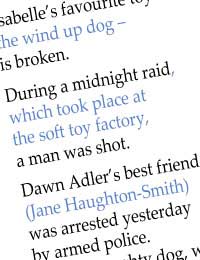English Language: What is Parenthesis?

Parenthesis is the addition of extra information to an already formed sentence. A parenthesis can be separated from the sentence with dashes, commas or brackets, and these are known as parentheses.
When the parenthesis is removed from the sentence, it should still be grammatically correct. So, to make sure that you have included a parenthesis correctly, reread the sentence to see if it makes sense without it. If it does, then you have successfully added a parenthesis.
You may have already been using parenthesis within a sentence without even knowing it. The parentheses (commas, brackets and dashes) are probably the most commonly used English grammar technique.
Which To Choose
Where parenthesis is concerned, it is completely your choice whether to use dashes, brackets or commas. You may find it easier to use one type of parenthesis within your writing, and only use another when you have to.Once you feel comfortable with one type of parentheses, you can always start practising with another.
Follow the guidelines below to find out which parentheses you should use within English text.
- Commas – When using commas to separate parenthesis within a sentence they may get confused with the other ‘normal’ commas. However, the plus side for using commas with the parenthesis is that it will flow like a normal sentence.
- Dashes – Using dashes with the parenthesis makes it more obvious that it is extra information, which technically, makes it appear separate from the original sentence.
- Brackets – Again, using brackets makes the parenthesis easily visible to the reader. However, using brackets can sometimes make the text appear unorganised.
Here are some examples of parenthesis within a sentence. All three of the parentheses will be used in these examples; note that the parenthesis will appear in bold to make it easier to spot:
- Isabelle’s favourite toy - the wind up dog – is broken.
- During a midnight raid, which took place at the soft toy factory, a man was shot.
- Dawn Adler’s best friend (Jane Haughton-Smith) was arrested yesterday by armed police.
- The naughty dog, which chewed my shoes, is now living outside in a kennel.
- The bread, which I bought from the supermarket, has already gone stale.
Sometimes, when using parenthesis in a sentence, writers often forget to actually end the parenthesis. When you use a parenthesis in a sentence, think of it as using brackets; you wouldn’t leave brackets open, so remember not to leave a parenthesis open either.
Leaving a parenthesis open can cause confusion within the sentence, which makes it difficult for the reader to understand the original meaning.
All of the following words and phrases are classed as parenthesis within a sentence; however, they are not normally used with brackets or dashes, and are more likely to be used with commas.
- However
- As a result
- Therefore
- So to speak
- For all intents and purposes
- As far as I am concerned
Parenthesis is very common in the English language; using parenthesis and parentheses helps add more information to a statement without stopping the flow of the reading or writing.
The easiest way to see if you have added a parenthesis into a sentence is to see if the sentence can survive without the added information.
- Different Uses for the Comma in English Grammar
- A Look at English Prepositions
- A Basic English Grammar Glossary
- A Look at English Nouns and Pronouns
- Using English Idioms
- How to Write Paragraphs
- Confusing Different Words in English Language
- Using English Verbs, Adverbs and Adjectives
- Why You Need to Know Common Grammar Terminology
- Children and English Grammar
- Why English Grammar Is Important


Re: Why English Grammar Is Important
There are a certain parts that werent.... Or There are certain parts that werent...
Re: Understanding Intonation and Stress in Speech
How much for the intonation e-book? Best regards, Lily
Re: English Language: Silent Letters
@Deb - according to the Cambridge Dictionary, it should be pronounced 'wenz.de', which doesn't sound right - I think…
Re: English Language: Silent Letters
I have never known the "d" in Wednesday to not be pronounced - it should be Wed-nes-day - which is from the Germanic Wodan's…
Re: Using English Verbs, Adverbs and Adjectives
i need to know all the adjectives and verbs for my GCSE exam omg i am sick of exams now they are anoying me
Re: Using English Idioms
I found the contents very useful and relevant to my classroom transations.
Re: What You Will Need to Learn English
i love reading your article it help me to understand how important for me to reading english.. i want to learn english…
Re: How to Write Paragraphs
As a teacher teaching English I find your website helpful. Cheers
Re: Ten Tips to Help You Learn English as a Second Language
The biggest mistake Spanish students make is trying to translate word for word. For example;…
Re: English Language: Silent Letters
A longtime since ive been in grammer school.I will be 80 years old my next birthday, This is a very enlightening ,and helpful…